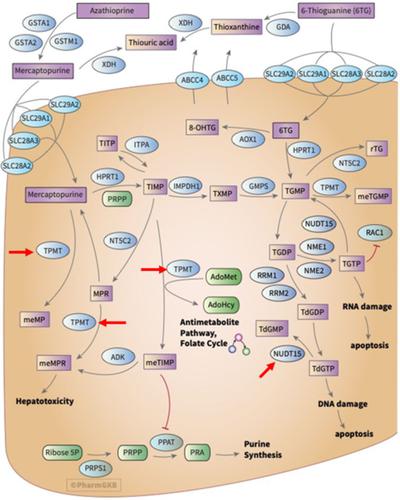当前位置:
X-MOL 学术
›
Pharmacol. Rev.
›
论文详情
Our official English website, www.x-mol.net, welcomes your
feedback! (Note: you will need to create a separate account there.)
Pharmacogenomics: Driving Personalized Medicine
Pharmacological Reviews ( IF 19.3 ) Pub Date : 2023-07-01 , DOI: 10.1124/pharmrev.122.000810 Wolfgang Sadee 1 , Danxin Wang 2 , Katherine Hartmann 2 , Amanda Ewart Toland 2
Pharmacological Reviews ( IF 19.3 ) Pub Date : 2023-07-01 , DOI: 10.1124/pharmrev.122.000810 Wolfgang Sadee 1 , Danxin Wang 2 , Katherine Hartmann 2 , Amanda Ewart Toland 2
Affiliation

|
Personalized medicine tailors therapies, disease prevention, and health maintenance to the individual, with pharmacogenomics serving as a key tool to improve outcomes and prevent adverse effects. Advances in genomics have transformed pharmacogenetics, traditionally focused on single gene-drug pairs, into pharmacogenomics, encompassing all “-omics” fields (e.g., proteomics, transcriptomics, metabolomics, and metagenomics). This review summarizes basic genomics principles relevant to translation into therapies, assessing pharmacogenomics’ central role in converging diverse elements of personalized medicine. We discuss genetic variations in pharmacogenes (drug-metabolizing enzymes, drug transporters, and receptors), their clinical relevance as biomarkers, and the legacy of decades of research in pharmacogenetics. All types of therapies, including proteins, nucleic acids, viruses, cells, genes, and irradiation, can benefit from genomics, expanding the role of pharmacogenomics across medicine. Food and Drug Administration approvals of personalized therapeutics involving biomarkers increase rapidly, demonstrating the growing impact of pharmacogenomics. A beacon for all therapeutic approaches, molecularly targeted cancer therapies highlight trends in drug discovery and clinical applications. To account for human complexity, multicomponent biomarker panels encompassing genetic, personal, and environmental factors can guide diagnosis and therapies, increasingly involving artificial intelligence to cope with extreme data complexities. However, clinical application encounters substantial hurdles, such as unknown validity across ethnic groups, underlying bias in health care, and real-world validation. This review address the underlying science and technologies germane to pharmacogenomics and personalized medicine, integrated with economic, ethical, and regulatory issues, providing insights into the current status and future direction of health care.
中文翻译:

药物基因组学:推动个性化医疗
个性化医疗为个人量身定制治疗、疾病预防和健康维护,药物基因组学是改善结果和预防不良反应的关键工具。基因组学的进步已经将传统上关注单基因-药物对的药物遗传学转变为药物基因组学,涵盖所有“组学”领域(例如蛋白质组学、转录组学、代谢组学和宏基因组学)。这篇综述总结了与转化为治疗方法相关的基本基因组学原理,评估了药物基因组学在融合个性化医疗不同要素方面的核心作用。我们讨论药物基因(药物代谢酶、药物转运蛋白和受体)的遗传变异、它们作为生物标志物的临床相关性,以及药物遗传学数十年研究的遗产。所有类型的疗法,包括蛋白质、核酸、病毒、细胞、基因和辐射,都可以从基因组学中受益,扩大药物基因组学在医学领域的作用。美国食品和药物管理局对涉及生物标志物的个性化治疗的批准迅速增加,这表明药物基因组学的影响日益增长。分子靶向癌症疗法是所有治疗方法的灯塔,凸显了药物发现和临床应用的趋势。为了考虑人类的复杂性,涵盖遗传、个人和环境因素的多组分生物标志物组合可以指导诊断和治疗,越来越多地涉及人工智能来应对极端的数据复杂性。然而,临床应用遇到了巨大的障碍,例如跨种族群体的有效性未知、医疗保健方面的潜在偏见、和现实世界的验证。这篇综述探讨了与药物基因组学和个性化医疗密切相关的基础科学和技术,并结合了经济、伦理和监管问题,为医疗保健的现状和未来方向提供了见解。
更新日期:2023-06-10
中文翻译:

药物基因组学:推动个性化医疗
个性化医疗为个人量身定制治疗、疾病预防和健康维护,药物基因组学是改善结果和预防不良反应的关键工具。基因组学的进步已经将传统上关注单基因-药物对的药物遗传学转变为药物基因组学,涵盖所有“组学”领域(例如蛋白质组学、转录组学、代谢组学和宏基因组学)。这篇综述总结了与转化为治疗方法相关的基本基因组学原理,评估了药物基因组学在融合个性化医疗不同要素方面的核心作用。我们讨论药物基因(药物代谢酶、药物转运蛋白和受体)的遗传变异、它们作为生物标志物的临床相关性,以及药物遗传学数十年研究的遗产。所有类型的疗法,包括蛋白质、核酸、病毒、细胞、基因和辐射,都可以从基因组学中受益,扩大药物基因组学在医学领域的作用。美国食品和药物管理局对涉及生物标志物的个性化治疗的批准迅速增加,这表明药物基因组学的影响日益增长。分子靶向癌症疗法是所有治疗方法的灯塔,凸显了药物发现和临床应用的趋势。为了考虑人类的复杂性,涵盖遗传、个人和环境因素的多组分生物标志物组合可以指导诊断和治疗,越来越多地涉及人工智能来应对极端的数据复杂性。然而,临床应用遇到了巨大的障碍,例如跨种族群体的有效性未知、医疗保健方面的潜在偏见、和现实世界的验证。这篇综述探讨了与药物基因组学和个性化医疗密切相关的基础科学和技术,并结合了经济、伦理和监管问题,为医疗保健的现状和未来方向提供了见解。
















































 京公网安备 11010802027423号
京公网安备 11010802027423号